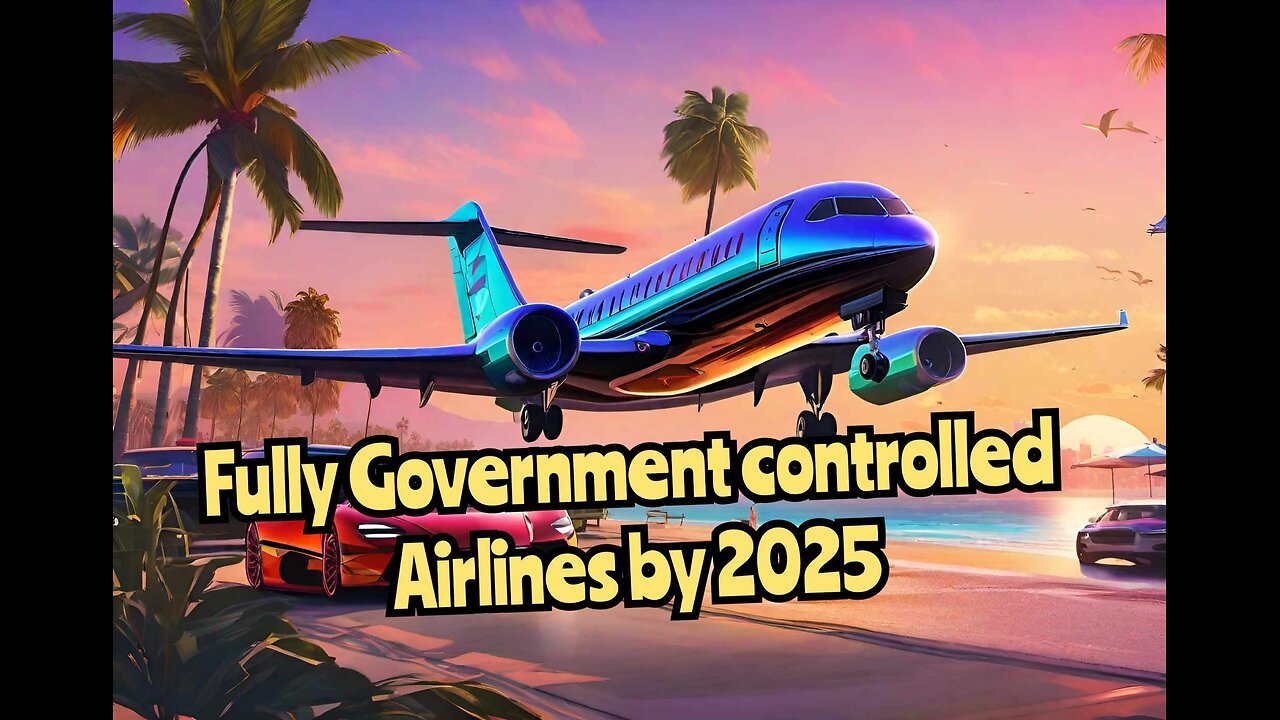Premium Only Content

Arline companies to be Federalized by 2025 , Permit application to be required to fly .
Here are some guidelines or tactics they will use
Federalizing private airline companies involves bringing them under the direct control or ownership of the government, typically at the national or federal level. The idea of federalizing private airline companies is not a common practice, as most countries prefer to maintain a degree of separation between government and private enterprises. However, there could be arguments for such a move, and here are some reasons why it might be considered:
National Security: Air travel is critical to national security, and having direct control over airline operations could enhance the government's ability to respond to security threats and emergencies promptly. In times of crisis, a centralized and coordinated response may be more effective.
Standardization and Regulation: Federalizing airlines could allow for a more standardized and regulated industry. This could ensure uniform safety standards, maintenance procedures, and operational protocols, reducing the risk of accidents and improving overall safety.
Economic Stability: By federalizing airlines, the government could potentially stabilize the industry during economic downturns. Government ownership might allow for financial support during crises, preventing the collapse of essential air travel services.
Infrastructure Coordination: As airports are often government-run, federalizing airlines could facilitate better coordination between airline operations and airport management. This integration might lead to improved efficiency in scheduling, maintenance, and infrastructure utilization.
Public Services Focus: A government-owned or controlled airline could prioritize public services over profit motives. This might lead to better accessibility for remote or underserved regions, ensuring that air travel remains a public service rather than a purely profit-driven enterprise.
Strategic Planning: A government-owned airline may enable better long-term strategic planning for the aviation industry. This could involve investments in new technologies, infrastructure, and sustainable practices, aligning with broader national goals.
Crisis Management: During significant crises, such as natural disasters or global pandemics, a government-owned airline could be more resilient and adaptable to changing circumstances, ensuring the continuation of essential air transport services.
While these potential benefits exist, it's crucial to consider the drawbacks and challenges associated with government ownership, such as concerns about efficiency, innovation, and political influence. Striking the right balance between government oversight and private enterprise is often the preferred approach, allowing for regulatory control while maintaining the benefits of market competition and innovation in the airline industry.
federalization, airline industry, national security, regulation, safety standards, economic stability, infrastructure coordination, public services, government ownership, crisis management, aviation, strategic planning, public-private partnership, air travel, emergency response, standardization, airport management, industry efficiency, innovation, market competition, private enterprise, government control, centralized operations, financial support, political influence, public safety, crisis resilience, sustainability, aviation technology, economic downturn, industry coordination, remote accessibility
-
 3:04:18
3:04:18
Mike Martins Channel
14 days ago $1.36 earnedMike in the Night E615 - The Fatigue is real People are fed up, Epstein list Americans won't let it go, Ukraine- major failure . Now Trump wants to continue this war.
1.69K9 -
 LIVE
LIVE
Nerdrotic
3 hours ago $8.48 earnedFantastic Four Baby Steps V Superman's James Gunn, South Park Returns | Friday Night Tights 364
2,562 watching -
 2:14:01
2:14:01
Twins Pod
7 hours agoHodgetwins & Blaire White ROUND 2! | Twins Pod - Episode 75 - Blaire White
18.2K10 -
 LIVE
LIVE
Dr Disrespect
6 hours ago🔴LIVE - DR DISRESPECT - BATTLEFIELD BAD COMPANY 2 - FULL GAME
2,844 watching -
 LIVE
LIVE
Sarah Westall
1 hour agoChance of War Increases in Sept, Genius Act War Bonds, NeoCons Surrounding Trump w/ Martin Armstrong
383 watching -
 LIVE
LIVE
LFA TV
19 hours agoLFA TV ALL DAY STREAM - FRIDAY 7/25/25
1,335 watching -
 1:06:06
1:06:06
vivafrei
5 hours agoTrump Lawyer Meets with Maxwell! Dems Can't Read! "Canadian" Man on the Street Identified? & MORE!
92.2K30 -
 2:07:13
2:07:13
Pop Culture Crisis
3 hours agoCelebrity DOOMSDAY PREPPERS, New Tradwife Pop Star? Pedro Pascal Online SMEAR CAMPAIGN | Ep. 885
26K3 -
 1:35:12
1:35:12
Tucker Carlson
6 hours agoAna Kasparian: Epstein Cover-Up, Israel Strikes Gaza Church, & the Great American Political Shift
92.7K239 -
 4:08:03
4:08:03
Donut Operator
7 hours agoI'M BACK/ CRIME/ WHERE MP7
75.1K5